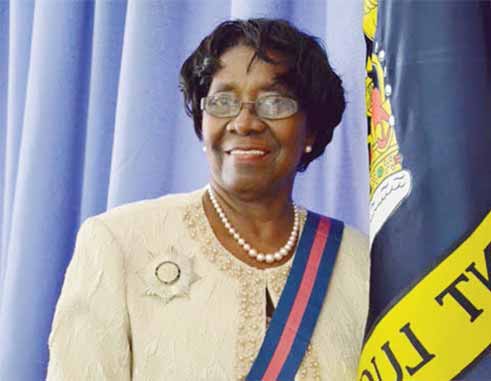
GOVERNOR General Dame Pearlette Louisy, Patron of the St Lucia Blind Welfare Association has underscored the scope, diversity and quality of the services it offers at no or relatively low cost to its clients, but said there was still a long way to go.
Dame Pearlette said that with such an impressive array of services and with such limited resources, “we have to agree that the St. Lucia Blind Welfare Association, the Caribbean Council for the Blind, Sight Savers and Partners, deserve the highest commendation for their sustained advocacy, effective leadership and creativity to date. Yet the Association is quick to admit tha “there is still a very long way to go”.
Speaking on the theme of the observance which was “Empowering today’s youth, tomorrow’s leaders, by promoting an inclusive society”, Dame Pearlette thought it “very appropriate, since all are agreed that investing in our youth is investing in our future”. She said: “As Patron of the Association, I take this opportunity to applaud its resolute determination to relentlessly pursue the development of an inclusive society as the best avenue to help break out of the box imposed by blindness in both our young and adult population”.
According to Dame Pearlette since its inception in 1972, the St. Lucia Blind Welfare Association, or “Blind Welfare” as it is more popularly and commonly called, had grown from an organisation that focused solely on running a sheltered school and workshop for the blind, to a dynamic organisation offering diversified services directed towards persons living with blindness, low vision and other forms of visual impairment in Saint Lucia.
She added: “Since blindness affects everyone in one way or another – the individual, the family, the community and the nation – its goal is the prevention of avoidable blindness and visual impairment, the restoration of sight where that is possible, and the creation of opportunities for those persons whose sight cannot be restored”.
She itemized the various services: Education–These services provide integrated education for the blind and visually impaired in regular schools alongside their sighted peers. Itinerant teachers – teachers who move from school to school – offer braille, large print and other low vision aids, and work with classroom teachers to provide the least restrictive environment possible for the students. The Association also provides both a centre-based and a home-based early intervention service for students with multiple disabilities including vision impairment.
Eye Health Programme– This programme addresses the whole spectrum of vision – from normal vision to total blindness. It focuses on awareness and prevention, and provides training, screening, assessments and low vision services. It operates Eye Care St. Lucia which was established to help reduce the incidence of avoidable or preventable blindness, and where possible, to generate income to sustain the Association’s services.
Dame Pearlette also mentioned the Kids Insight Project, the very successful partnership with the Lions Club and the West Virginia University Eye Institute. For the past thirteen years, a team of paediatric eye specialists have been visiting Saint Lucia annually to provide eye examinations, surgeries, glasses, low vision aids and training for children with blinding eye conditions.
The Diabetic Retinopathy Screening and Treatment Project. Noting that the Caribbean had a very high prevalence of diabetes which can lead to some form of diabetic retinopathy and other blinding eye diseases, Dame Pearlette said that Saint Lucia, where the prevalence was “extremely high”, was selected, through the efforts of the St. Lucia Blind Welfare Association, as one of the beneficiaries of a screening and treatment programme funded by the Queen Elizabeth Diamond Jubilee Trust and managed by the Caribbean Council for the Blind.
The Rehabilitation and Counselling Programme which provides technical adjustment to blindness, self-management skills and personal support systems for the blind. Here the focus was on orientation and mobility skills, vocational training and income-generating opportunities. The idea is for no one to be left out of having a decent quality of life simply because he or she is differently abled. This is the basic tenet of an inclusive society, and one of the guiding principles of the Association. This service however is struggling to meet demand, as currently there is only one officer serving the entire island.
But emphasizing that the Association still had a very long way to go in providing services, Dame Pearlette said sustained progress was hampered by what it has identified as:
*The impact of global economic adjustment on the capacity of traditional friends to support agencies like the Blind Welfare Association;
•The ability of both man-made and natural disasters to siphon available resources from human service agencies like itself;
•National, regional and international competition for scarce resources; and
•Local penetration of the new “me and only me” culture.
Notwithstanding, the Association continued to come up with creative ways to raise the funds it needs to sustain its many services. From time to time local organisations come to its assistance to organise fund-raising activities in support of its programmes. We can mention, for example, the Grand Tea Party Fund for Sight organised by the Piton Lions of Soufriere which raised $7,000.00; the Walk a Mile in my Shoes organised by the Soca Fitness Company which raised $4,000.00; the Special Lunch organised by the Multiple Disabilities and Vision Impairment Department which raised about $4,700.00.
She added: “Our thanks to them and to all the many others who, in big ways as well as small, are making their contribution towards the mission of the Association and that of the Caribbean Council of the Blind which is the prevention of blindness and vision impairment, restoring sight, and creating opportunities for persons whose sight cannot be restored.”













